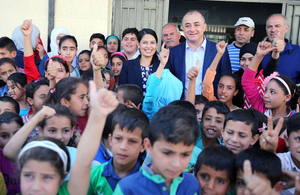First countries set to benefit from funding to ensure children get an education in times of crisis
First countries to receive funding from the Education Cannot Wait initiative announced at a meeting of its High Level Steering Group.

Priti Patel visits Syrian refugee students in Lebanon. PIcture: FCO
The first countries to receive funding from the Education Cannot Wait (ECW) initiative were announced today at a meeting of its High Level Steering Group, attended by International Development Secretary Priti Patel.
Addressing the group at the United Nations General Assembly in New York, Ms Patel said a generation of children depended on the scheme to which the UK pledged £30 million at the World Humanitarian Summit earlier this year.
The steering group, made up of senior Ministers and aid representatives from around the world, confirmed that the initial investments from the fund will give nearly 1.5 million children in Chad, Syria and Yemen access to a quality education over the next two years, as well as invest in strengthening national and global humanitarian responses to education.
ECW estimates that worldwide, 75 million school-aged children and youth are in desperate need of educational support, either in danger of, or already missing out on their education because of schools destroyed by conflict and natural disasters or shut down by disease outbreaks. This is depriving children of the skills they need to build safe, strong communities and economies when they reach adulthood.
The scheme aims to better coordinate support for and drive investment in education for all children and young people affected by humanitarian emergencies and protracted crises by 2030.
International Development Secretary Priti Patel said:
The UK has led the way supporting hundreds of thousands of refugee children to get an education, particularly in Jordan and Lebanon where so many Syrians have been displaced because of the terrible conflict in their country.
This is the right and moral thing to do but it is also firmly in the UK’s national interest. Should the international community fail to rise to the challenge of dealing with protracted humanitarian crises then the suffering will continue, millions will be left without hope and people will be pushed to undertake dangerous journeys in the hope of better lives.
As an outward-looking, globally engaged country on the world stage, the UK wants to play its part in making sure that doesn’t happen by shaping and leading bold new international responses fit for the 21st century.
Ms Patel also called on the international community to step up their support for education in crises:
We cannot achieve this without the support of the whole international community. The UK, along with some key partners, has stepped up its global leadership and financing on this issue. It is now crucial that others do the same and step up to the plate. Together we can make progress on this critical issue.
Ms Patel visited the Za’atari refugee camp, Jordan, and an informal tented settlement in the Bekaa Valley, Lebanon, earlier this year to see first-hand how UK-funded programmes are delivering education and healthcare for displaced people. The ECW steering group said it will focus on getting children into school in Lebanon.
Last year Lebanon reached 200,000 Syrian refugees with formal education and now plans to build on this to reach all out-of-school refugee and Lebanese children in the country with quality formal and non-formal education, while improving education quality and governance at all levels.
The UK Government is committed to demonstrating practical ways that governments, donors, aid organisations and the private sector can work together to allow the international community to overcome the day-to-day challenges of delivering vital life opportunities like education in areas affected by conflict and instability.
Working with UNICEF, the UK launched the No Lost Generation Initiative more than two years ago for education in Syria and the region which has so far reached over 500,000 children. We are also working to expand access to vocational education and training starting with a World Bank programme providing over 30,000 Syrians and Jordanians with on-the-job training.
Notes to editors:
For more information about Education Cannot Wait visit: http://www.educationcannotwait.org/
In her first overseas visit as International Development Secretary, Priti Patel visited Jordan and Lebanon in August 2016. Read more at: https://www.gov.uk/government/news/priti-patel-calls-for-fresh-international-push-on-education-and-jobs-for-syrian-refugees-on-visits-to-jordan-and-lebanon
The first-ever World Humanitarian Summit (WHS) took place in Istanbul on 23-24 May 2016. The Summit brought together governments, NGOs, civil society and the private sector to look at how we respond to the huge strains being placed upon the international humanitarian system.
Building on the success of the London Syria Conference the UK played a key role at the WHS, continuing to demonstrate Britain’s leadership in responding to protracted crises.
At the London Syria Conference, the international community raised more than $12 billion to support the response to the Syria crisis – the largest amount raised in a single day for one humanitarian crisis. This funding will meet the immediate and long term needs of those affected by crisis within Syria and support neighbouring countries like Jordan, Lebanon and Turkey to cope with the number of refugees they are hosting.
In 2015, humanitarian agencies received only 31 per cent of their education funding needs, down from 66 per cent a decade ago. Despite a 126 per cent increase in education requirements since 2005, funding increased by just 4 per cent. Moreover, education systems equipped to cope with protracted crises cannot be built on the foundations of short-term – and unpredictable – appeals.
Dubai Cares, the European Union, Netherlands, Norway, the UK Department for International Development, and the United States Government have all made financial contributions so far.
General media queries (24 hours)
Email mediateam@dfid.gov.uk
Telephone 020 7023 0600
If you have an urgent media query, please email the DFID Media Team on mediateam@dfid.gov.uk in the first instance and we will respond as soon as possible.